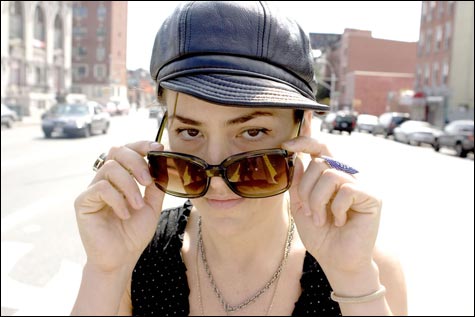
DAMBUSTER “When I started singing, I felt very uncomfortable. It made me very nervous. And my personality is that when something scares me, I go directly into it.” |
Lack of talent, charisma, and/or personality can prevent a good band from achieving greatness — but too much of a good thing can also be a problem. It was this sort of excess of talent and personality that held Boston’s Dambuilders back from the big breakthrough Elektra had planned for them in the ’90s. As the main singer-songwriter, bassist Dave Derby was the band’s de facto frontman, but violinist Joan Wasser, with her tough yet alluring sound and that trademark shock of blond streaking through her dark hair, was an equally potent focal point. In addition to being a stylish guitarist, Eric Masunaga had an æsthetic all his own, and he doubled as a producer in Boston and beyond. Even drummer Kevin March stood out enough to score dozens of gigs after the band’s demise, eventually landing a semi-permanent role with Robert Pollard and Guided by Voices. The result was a hyperkinetic kind of glam-tinged, punk-inspired, guitar-driven rock that had an awful lot going on.
It’s no surprise that Derby has gone on to thrive in New York as a singer-songwriter, that Masunaga continues to distinguish himself as a producer, and that March has had continued success as a drummer for hire. Wasser could easily have done the same as a violinist, and for a time she did, playing on tracks by everyone from Lou Reed to Nick Cave to Sheryl Crow. But it was as a member of both Antony and the Johnsons and Rufus Wainwright’s band that she began developing as a singer-songwriter. Since 2002, she has performed under the name Joan As Police Woman (people always assumed that solo “Joan Wasser” gigs were violin recitals), cultivating an image that couldn’t be more different from the imposing glamazon woman of the Dambuilders. Indeed, she doesn’t have much time for session work anymore: she’s too busy touring the second Joan As Police Woman album, To Survive (Reveal).

Wasser, who comes to the Middle East upstairs this Wednesday, has fond Dambuilders memories. “I had a great time with that experience,” she says when I reach her at home in Brooklyn. “I was able to tour and make a living off it. That’s more than I could have hoped for from making music. And I feel good about the music we made. I haven’t listened to that music recently because I just don’t have time. I mean, I’m on tour until December. But I did some of my first songwriting with the Dambuilders. Nothing like what I’m doing now, but it was a start.”
Session work helped Wasser gain a foothold in New York. “In order to stay alive as a musician here, I just took every gig. I put myself out there and I got to know a lot of people. But I didn’t sing or write songs in any of those bands. I was playing violin mostly, exploring for myself how the violin works in a rock band. I was always very comfortable on stage, very comfortable playing the violin, but when I started singing, I felt very uncomfortable. It made me very nervous. And my personality is that when something scares me, I go directly into it. I had to figure out what was scaring me so much about singing. And, really, what it was is that singing is so revealing — and I wasn’t ready at that point to reveal myself. I had always had my guard up. You know, I was very tough — I could carry that SVT cab by myself. In a certain way it was because I was always playing with men. I think I felt like I had to compete. I was just working it out.”
Wasser’s transition from tough-grrrl violinist to confessional singer-songwriter was aided by tenures with Antony Hegarty and Wainwright. “When I met Antony, it was great for me because he was someone who was coming from a similar place that I was. It’s not the same music, but it’s coming from a similar source. That helped me feel more confident about my songwriting. And as I got positive feedback from people, it helped a lot. I mean, at this point I’m very clear with the knowledge that if I have a feeling, then I’m one of a million people who have had the same feeling. And there’s nothing to be afraid of in terms of expressing those feelings. It’s been a way for me to grow up.”
On both Police Woman full-lengths, To Survive and 2006’s Real Life (both on the British label Reveal), she plays most and sometimes all of the instruments. But she had the “luxury” of hiring a string section for the new disc. The album also features two guest vocalists, David Sylvian on the opening “Honor Wishes” and Wainwright handling lead on the closing track, “To America.” Live, Wasser plays guitar and keyboards and is usually supported by the rhythm section of drummer Ben Perowsky and bassist Rainy Orteca, though only Perowsky will be joining her for the Middle East show. And though she’s not nearly as intimidating as the Wasser of yore, she demonstrates her strength in other ways.